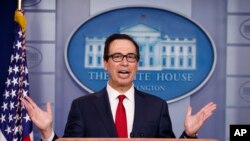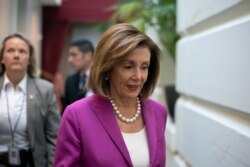The White House and Congress are engaged in tough, down-to-the-wire negotiations over raising the U.S. government's borrowing limit and agreeing to new spending levels for as long as the coming two years.
President Donald Trump's latest tweetstorm against four Democratic progressive lawmakers and the early stages of the 2020 presidential election campaign are grabbing the headlines in Washington. But the outcome of behind-the-scenes discussions between Treasury Secretary Steven Mnuchin and House Speaker Nancy Pelosi about the country's debt ceiling — its cap on borrowing to run the government — and the 2020 budget could prove more consequential.
Agreement on a new debt ceiling and a deal on a new two-year spending plan beginning in October could take both issues off the table ahead of Trump's November 2020 re-election bid and Democratic efforts to oust him after a single term in the White House.
The century-old debt ceiling is a legal cap on the amount of money the government can borrow to cover revenue shortages. In March, the debt limit expired and the debt now totals $22.5 trillion.
Mnuchin, Trump's point man in the spending talks, and Pelosi, leader of the Democratic-controlled House of Representatives, have talked several times in recent days and, according to news accounts, have made progress in reaching a deal, but aren't at the finish line yet. Pelosi refuses to cut a deal on raising the debt ceiling until the two sides agree on new spending levels as well.
The discussions are complicated by the legislative calendar, with House lawmakers set to leave Washington July 26 for their annual five-week summer recess and the Senate a week later. Whether Trump will sign off on any deal reached by Mnuchin and Pelosi is also in question, even though the Treasury secretary has been briefing the president about the ongoing discussions.
Mnuchin has emphasized the need to raise the debt ceiling before Congress leaves on vacation. Although he has taken steps to avoid a default on the country's financial obligations, Mnuchin and experts outside official Washington agree that the government could run out of money to pay its bills in early September, when Congress still possibly is on vacation or just returning to the capital.
The U.S. has never defaulted on its debt obligations, about 30 percent of which are held by foreign governments, led by China and Japan.
But in years past, Congress has several times walked up to the deadline for raising the debt ceiling before approving periodic increases. Often it has proved to be an exercise in legislative brinksmanship that created tension in world financial markets about the mere prospect that the world's biggest economy would even think of defaulting on its debt like a deadbeat consumer overdue on a monthly credit card debt.
Federal Reserve chairman Jerome Powell testified to Congress last week that he assumes the debt ceiling will be raised, saying, "I wouldn't be able to capture the range of possible negative outcomes" of not increasing it. Experts say a default could lead to a spike in interest rates on loans or a stock market tumble.
"The credit of the U.S. government is of the utmost importance," Mnuchin said. "So the debt ceiling has to be raised."
He said the White House and Republican lawmakers, along with opposition Democrats, prefer that an agreement be reached on both a debt ceiling increase and a new budget.
"To the extent we can agree on the debt ceiling and a budget deal, that is the first choice," he said. "We're getting closer."
One major stumbling block to a deal is reaching agreement on spending levels for defense and domestic social welfare programs. The Democrats are insisting on parity in raising spending in both categories. The White House has agreed to increased government spending overall, but not to as much as Democrats want for their favored domestic programs.
Trump once said he could erase the U.S. debt if he won two terms — eight years — in the White House, but the $19 trillion debt he inherited when he took office in early 2017 has jumped on his watch, increased by chronic annual budget overspending by the government and a $1.5 trillion tax cut Trump championed.
Pelosi has also called for a joint deal encompassing an increase in the debt ceiling and a budget accord, saying an agreement only on a debt ceiling increase is not acceptable to her majority bloc of House Democrats.
She also objected Monday to a White House fallback proposal for a short-term debt ceiling increase for a few weeks if negotiations falter on a budget deal.
But if no spending deal can be reached in the current talks, negotiators have till the end of September to reach a new budget agreement, when current spending for government agencies expires before the start of a new fiscal year on Oct. 1.
Last year, budget battles in Washington, chiefly over Trump's demand for $5 billion to build a wall along the southern U.S. border with Mexico, extended well into December. The warring parties were unable to reach agreement, leading to a 35-day partial government shutdown that extended to late January.







